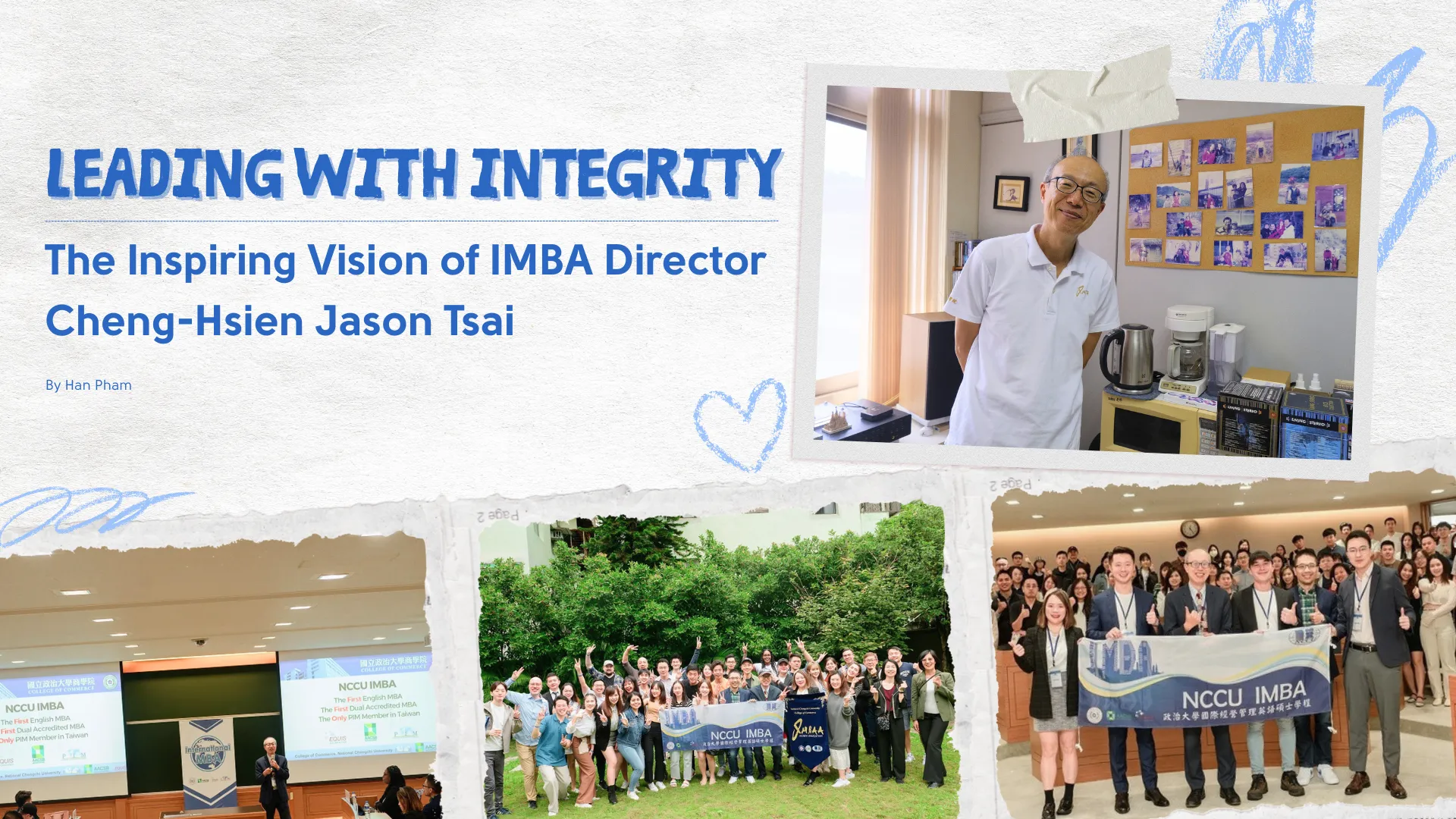For more than two decades, Professor Cheng-Hsien Jason Tsai, Director of National Chengchi University's International Master of Business Administration (IMBA) program, has been reshaping what it means to be a business leader in Taiwan. He's done it as a pioneering scholar in risk management, helping to launch one of the country's first risk management evaluation standards. He's done it as head of NCCU's Department of Risk Management and Insurance, as Executive Director of the IMBA, as an independent board member in industry, and as an active leader in his church community. Through it all, his message has remained consistent, shaped from the very start of his remarkable path.
From Military Precision to Academic Freedom
Professor Jason Tsai discovered his passion for academia in an unexpected place: the military. Serving as a finance officer responsible for payroll, he worked closely with career soldiers and realized that he was not born for an environment governed by strict discipline. "I understood that I might not thrive in a workplace where I had to be excessively strict with people," he says. "Academia felt like a better fit, and I have always enjoyed reading and learning."
Initially a chemistry major ("Back then, people thought men should study science or engineering"), Jason later switched to finance at National Taiwan University. He earned his MBA and then pursued a PhD in the United States. His academic focus shifted to risk management, a field he recognized as both pervasive and evolving in Taiwan during that period.
"Risk is everywhere," he says. "There are many things you cannot completely prevent from, but you can prepare for them, reduce the probability of failure, and lessen the impact if failure occurs," Jason explains the essence of risk management. "It's not just about avoiding danger, it's about recognizing uncertainty as both a challenge and an opportunity. And different risks require different management strategies."
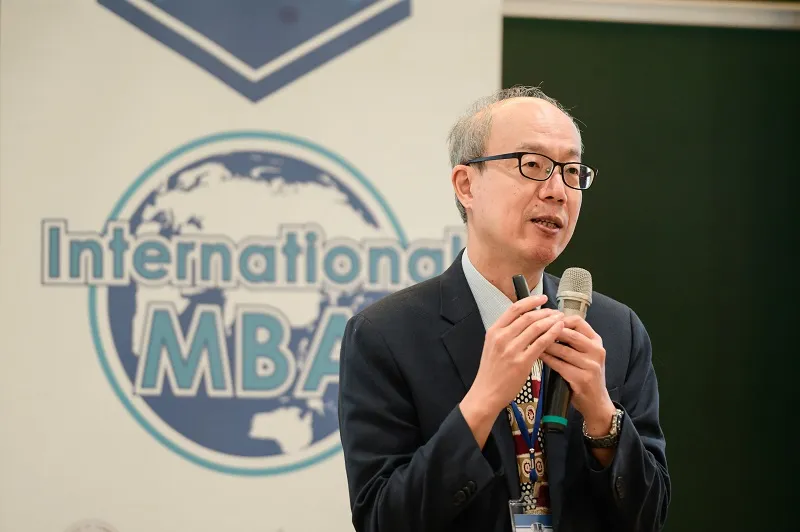
▲Professor Jason Tsai is head of NCCU's Department of Risk Management and Insurance, Executive Director of the IMBA, an independent board member in industry, and also an active leader in his church community.
The IMBA Director: Who Stayed for the Mission
When Jason began teaching at NCCU, risk management was still a new field in Taiwan. Recognizing this emerging landscape, he helped shape its direction, ensuring the curriculum developed students' critical thinking skills, connected with industry needs, and kept pace with global research. "We train students to keep asking why, to develop critical thinking, and to understand what the industry needs," he says.
Becoming IMBA Director wasn't part of Jason's career plan. "To be honest, we usually take turns in administrative roles," he says with a laugh. "As a professor, I have a responsibility to serve."
Today, he holds two positions: Chair of the Department of Risk Management and Insurance, and Director of the IMBA program. Balancing the two is challenging, but Jason saw an opportunity to infuse the IMBA with his integrity vision, one that merges academic rigor with cross-cultural business insight.
Asked what keeps him motivated after decades in academia, Jason glances at the shelves in his office lined with case binders and industry reports. Then he smiles. "It’s the students," he says. "I've received so much in my life. If I can give even a small part of that back and help them see the bigger picture, that's worth more than any title."
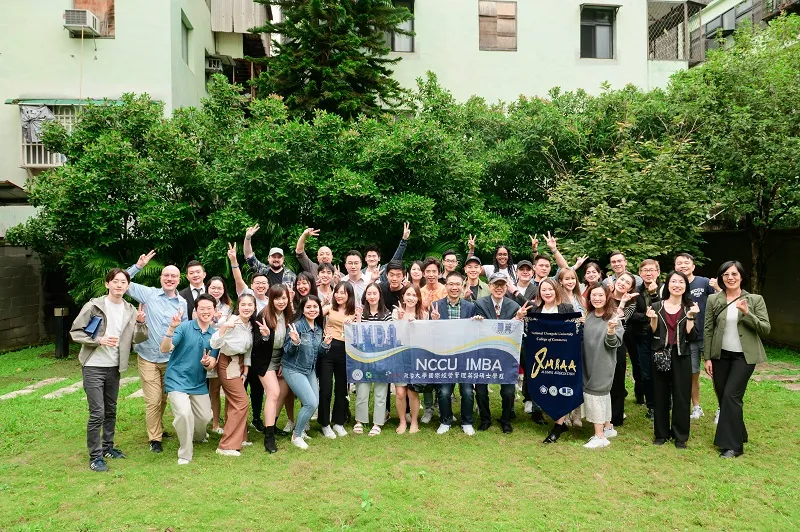
▲"I've received so much in my life. If I can give even a small part of that back and help them see the bigger picture, that's worth more than any title." Jason said while being asked about how he become the director of IMBA.
IMBA, A Global Classroom with Local Relevance
Inside the classroom, NCCU's IMBA students expect high standards and rigorous training. Jason describes the journey as diverse, demanding, and rewarding. Some students initially struggle with the program's strict attendance policy, but many later recognize its value. "This may be the last time these future leaders sit in a classroom before they go out and make important decisions," Jason explains. "I want them to walk away having truly learned something they can apply in real-world situations."
Under his leadership, the IMBA has become a training ground that offers international exposure, industry experience, and academic excellence; all tailored to the unique dynamics of Asia's business environment.
It begins with the program's internationally diverse setting. Beyond students from Southeast Asia, Europe, the Americas, and beyond, the IMBA also welcomes visiting professors from around the world. "Different nationalities bring different ways of thinking and expressing ideas," Jason notes. "That enriches the classroom, sparks creativity, and helps students develop genuine cross-cultural understanding."
All courses are taught in English, but Jason emphasizes that language is rarely the greatest obstacle. "Our professors are skilled at bridging linguistic gaps," he says. "The real challenge is making sure students can apply what they learn."
Another key strength is the faculty's real-world experience. Jason transitioned from industry, and nearly one-third of IMBA professors have served as senior executives, including leaders from companies such as TSMC. This allows students to learn both theory and practical lessons from those who have successfully applied them.
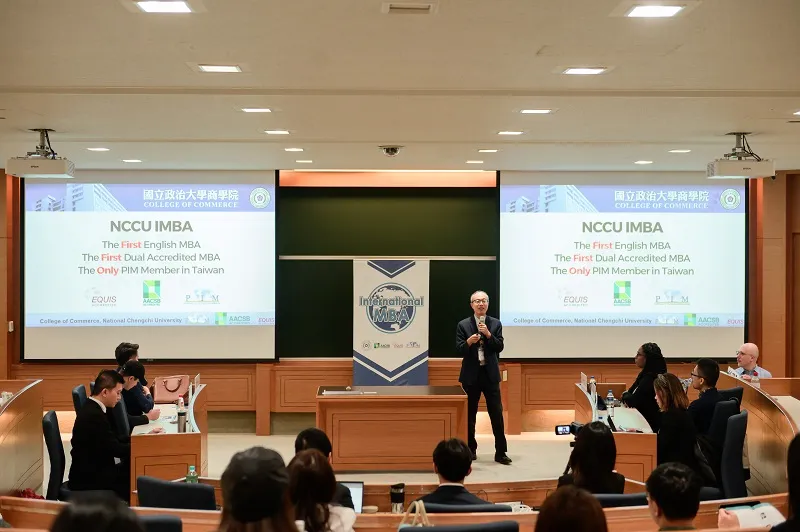
▲"This may be the last time these future leaders sit in a classroom before they go out and make important decisions," Jason explains. "I want them to walk away having truly learned something they can apply in real-world situations."
Equally important are NCCU's distinguished faculty members, whose research and teaching are rooted in Asia-centric business realities. While the program emphasizes global principles and analytical methods, it leverages Taiwan's local case studies and scenarios tailored to the region, from high-tech sectors like semiconductors to the challenges of small and medium-sized enterprises. "Our examples aren't just imported from the U.S. or Europe," Jason points out. "They're grounded in the environment where our students will build their careers."
Students can also take advantage of NCCU's dual-degree programs. "It's an incredible value," Jason says. "They can earn a degree from NCCU and a partner university overseas, expanding both their academic credentials and their professional networks."
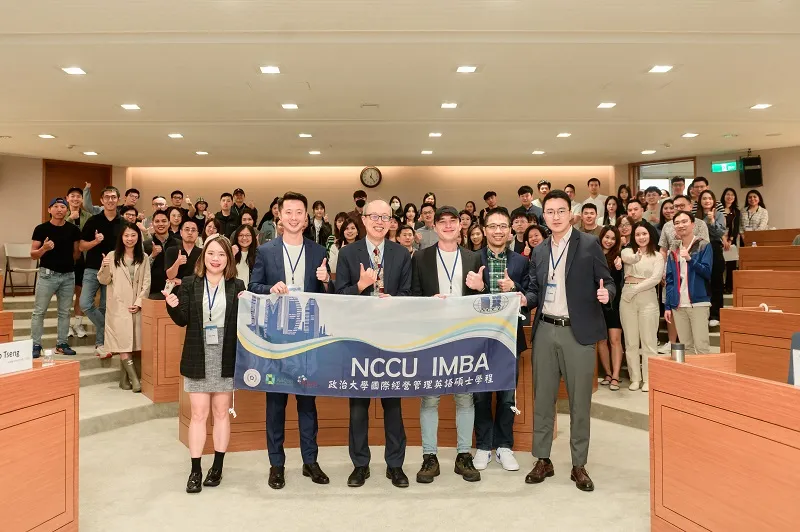
▲Jason believes that future leaders must connect profit with people, strategy with empathy, and global vision with local realities.
Integrity Leadership in Action
When Jason discusses leadership, he consistently emphasizes one key quality: integrity thinking.
Rather than focusing solely on speed, profit, or efficiency, Jason believes that future leaders must connect profit with people, strategy with empathy, and global vision with local realities. This integrity approach transforms business strategy into something not only profitable but also sustainable and humane.
In the IMBA classroom, Jason encourages students to look beyond common solutions, to bridge the gap between technological capability and ethical responsibility by weighing diverse perspectives and making decisions that consider both financial outcomes and human impact.
In case discussions, Jason often places students in difficult scenarios, such as corporate downsizing. "Most people focus only on the financial metrics," he explains. "But real leaders ask: what happens to morale? How will this affect the community? What alternatives exist that balance business survival with human dignity?"
It's this broader lens, Jason argues, that sets true leadership apart, and that technology cannot replace. "Nowadays, AI can process vast amounts of information and deliver tailor-made insights," he says. "But AI doesn't understand empathy or values. It can't connect logic with compassion, or data with human dignity. That's where people still have an edge."
In an era of accelerating change, integrity thinking is not just a skill set; it is a safeguard for leaders who can navigate cultural diversity, manage risk in complex environments, embrace technological disruption, and, above all, make decisions that serve both their organizations and the people behind them.
For Jason, integrity leadership is more than a management style. It is a philosophy of living, teaching, and serving, a way of shaping a world where business success and human flourishing go hand in hand.
Life Beyond the Office
Despite his towering résumé, meeting Professor Jason on a Friday morning feels less like an interview and more like a lively conversation over coffee. Within minutes, his easy humor, zest for life, and deep commitment to serving others are unmistakable. But that service-oriented mindset wasn't always there. Early in his career, Jason admits that he was far more self-focused. The turning point came after his family business collapsed, leaving him with a challenging life ahead. "It made me rethink everything," he recalls. "It's not about what you've lost, but about what you still have."
For all his professional responsibilities, Jason maintains a surprisingly balanced personal life. His Christian faith plays a central role, and the guiding principle is simple: "Love God, love people." That conviction has gradually transformed the way he sees leadership, not as a pursuit of personal success, but as a calling to serve and uplift others. "Now I try to turn what I've received into a blessing for others," he says.
That commitment to balance shows in the rhythms of his daily life. He swims regularly, spends intentional time with his family, and makes a point of having lunch dates with his wife, a ritual for uninterrupted conversation. Family trips and church activities round out his schedule, ensuring that his relationships remain as strong as his professional commitments.
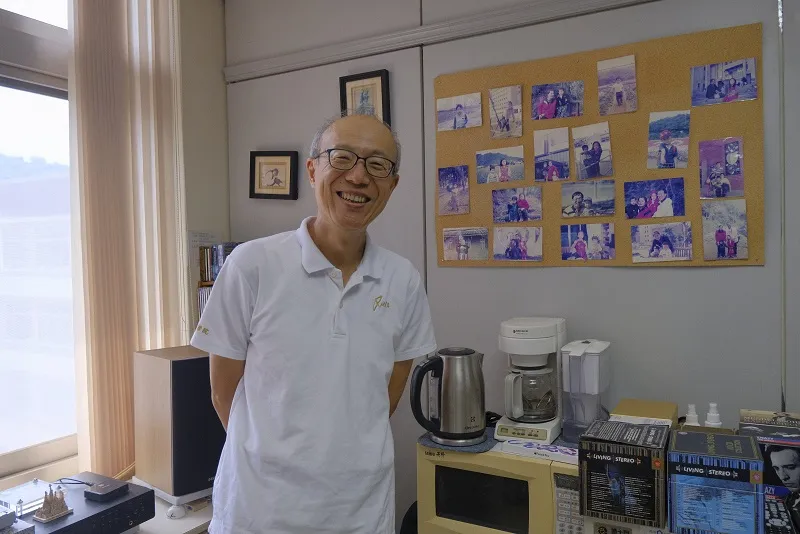
▲Meeting Professor Jason on a Friday morning feels less like an interview and more like a lively conversation over coffee. Within minutes, his easy humor, zest for life, and deep commitment to serving others are unmistakable.
A Message to Future Leaders: Perspective Is Everything
This sense of balance is also what Jason passes on to his students. Asked what advice he gives them, he pauses, then smiles. "Learn to see not just what you've lost, but also what you still have. Even challenges that seem negative on the surface can teach you a lot, if you're willing to shift your perspective."
Professor Jason's advice mirrors his journey: from the discipline of military service to the rigor of academic leadership, from the hardships of business failure to the responsibilities of directing an international program. Each chapter has reinforced his belief in balancing the measurable with the meaningful, profit with principle, and strategy with empathy.
And in a world where artificial intelligence can replicate data but not wisdom, Jason argues, that balance may be the most valuable competitive advantage of all.

